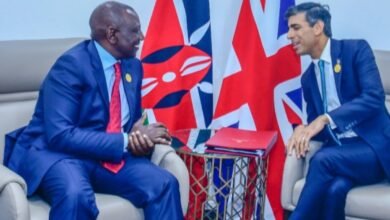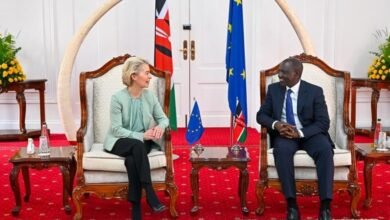
The International Court of Justice (ICJ) has ruled in favour of Somalia over maritime border row with Kenya.
According to ICJ, there is no evidence to show Somalia submitted to Kenya’s use of latitude and longitude to determine maritime borders.
ICJ said that using Kenya’s method would not result in equitable determination of the maritime borders with Somalia.
Kenya’s claim that delimitation would endanger the livelihoods of fishing communities was not founded, ruled the ICJ.
For the past four decades, Kenya has said a line due east of the point where the two countries meet at the coast represents the maritime border.
Somalia, however, argued in court that the sea frontier should follow on in the same direction as the land border.
Somalia said the talks had failed and it went to the ICJ instead. Somalia was angered by Kenya selling exploration licenses in the disputed zone to two multinationals in 2012, this is according to a report by Reuters.
Speaking before the judgment was delivered, Somalia’s Deputy Prime Minister Mahdi Mohamed Guled told the BBC that his country “believes in the rules-based system… that’s why we came to the court”.
The panel of 14 judges sitting in The Hague said that Kenya had not proved that Somalia had previously agreed to its claimed border.
Instead, they drew a new line which has split the disputed area in two.
The court is supposed to be the final arbiter in disputes between nations.
But with Kenya refusing to recognise the ICJ’s jurisdiction, it is not now clear what will happen. ICJ has no means to enforce its rulings, according to the BBC.
The point of disagreement between Kenya and Somalia has the nature of the line of the maritime boundary.
While the North of Africa country asserts a centre line from the Kenya/Somalia land boundary terminus, Kenya has maintained her stand on a straight line.
The disputed area is believed to be rich in oil and gas, with both countries accusing each other of auctioning off blocks even as the case is in court. The ICJ in 2019 set public hearings for between September 9 and September 14 of that year but would later push the start date to November 4 after granting Kenya’s request of more time to recruit a new legal team.
In June last year, Kenya then requested another postponement, this time citing the pandemic.
The United Nations (U.N) delayed the hearing till March 2021 over Kenya’s need to postpone the hearing.
Four months later, on July 22, President Uhuru Kenyatta reiterated Kenya’s firm ground never to surrender any part of her territory to anyone.
He said Kenya will continue to guard its borders and cautioned unnamed external forces against disrespecting the country’s territorial integrity.
“We will not accept anyone claiming ownership of any part of our land. Just as we have respected boundaries of other countries, we expect that our borders and land are equally respected,” said the President.
The Head of State maintained Kenya is a peace-loving nation and will continue to jealously guard its borders and cautioned unnamed external forces against disrespecting the country’s territorial integrity.
“As a peace-loving country, we are not the type to be attacked or threatened or even allow an inch of our country to end up in the hands of other people. We are ready to defend ourselves just as we have defended peace in other countries.”





